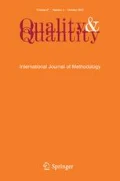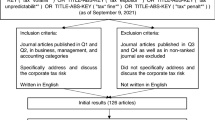Abstract
The literature provides various theories relating to the relationship between corporate social responsibility (CSR) and tax avoidance. If firms view both CSR activities and tax payments as paths toward contributing to society, CSR and tax avoidance activities exhibit a negative relationship. Conversely, the two activities exhibit a positive relationship if firms engage in CSR for the purpose of risk management. This study examines the effect of CSR on corporate tax avoidance using a matching approach. Three matching algorithms, namely nearest neighbor, radius, and kernel algorithms, are used to match the two groups of firms (CSR and non-CSR firms) in order to correct for sample selection bias. This study adopts Chinese listed firms during 2009–2016 as a research sample. Most empirical results show that CSR firms have higher book-tax differences and lower effective tax rates. This indicates that CSR firms are more aggressive in their tax avoidance. These findings imply that firms engage in CSR activities as a risk management strategy.
Similar content being viewed by others
Notes
According to corporate culture theories, if the corporate culture recognizes that a corporate should not view shareholder wealth maximization as its only goal, but should assume the responsibility of increasing social welfare and making contributions to the society, the corporate is likely to implement CSR (Carroll 1979; Garriga and Mele 2004; Mackey et al. 2007).
If we simply compare firms that engaged in CSR with those that did not, this may produce selection bias. The selection bias can be shown as the following equation:
\(E(t_{1i} |c_{i} = 1) - E(t_{0i} |c_{i} = 0)\) \(= E(t_{1i} - t_{0i} |c_{i} = 1) + E(t_{0i} |c_{i} = 1) - E(t_{0i} |c_{i} = 0).\)
The observed difference in tax avoidance between the two groups can be represented by the sum of the ATT and selection bias.
This study applies nearest neighbor matching with replacement, meaning that comparison unit can be used more than once as a match. Matching with replacement helps to reduce bias (Dehejia and Wahba 2002).
This study uses a quarter of a standard deviation of the sample estimated propensity as a tolerance level, which is suggested by Rosenbaum and Rubin (1983).
This study chooses 0.05 as the bandwidth value for the kernel matching. Low bandwidth values yield an unbiased estimate of the true density function.
Such a development index refers to a group of CSR indices such as International Organization for Standardization 26,000, Global Reporting Initiative, Dow Jones Sustainability Index, Wealth Magazine CSR index, and Financial Times Stock Exchange 4 Good Index.
References
Carroll, A.B.: A three-dimensional conceptual model of corporate performance. Acad. Manag. Rev. 4(4), 497–505 (1979)
Cronqvist, H., Low, A., Nilsson, M.: Does corporate culture matter for investment and financial policies? Working paper, The Ohio State University, Nanyang Technological University, and University of Colorado at Boulder (2007)
Dam, L., Scholtens, B.: Does ownership type matter for corporate social responsibility? Corp. Gov.: Int. Rev. 20(3), 233–252 (2012)
Davis, A.K., Guenther, D.A., Krull, L.K., Williams, B.M.: Do socially responsible firms pay more taxes? Account. Rev. 91(1), 47–68 (2016)
Dechow, P., Sloan, R., Sweeney, A.: Detecting earnings management. Account. Rev. 70, 193–225 (1995)
Dehejia, R., Wahba, S.: Propensity score-matching methods for nonexperimental causal studies. Rev. Econ. Stat. 84(1), 151–161 (2002)
Desai, M.A., Dharmapala, D.: Corporate tax avoidance and high-powered incentives. J. Financial Econ. 79(1), 145–179 (2006)
Dhaliwal, D.S., Li, O.Z., Tsang, A., Yong, Y.G.: Voluntary nonfinancial disclosure and the cost of equity capital: the initiation of corporate social responsibility reporting. Account. Rev. 86(1), 59–100 (2011)
Dierkes, M., Coppock, R.: Europe tries the corporate social report. Bus. Soc. Rev. 16, 21–24 (1978)
Dufays, F.: The effect of culture on businesses perception of CSR. Ph.D. dissertation, University Maastricht (2005)
Erekson, O.H., Gorman, R.F., Molloy, L.: Innovations in environmental performance: the importance of financial performance and management quality. Int. J. Bus. Innov. Res. 2(4), 331–353 (2008)
Fleischer, V.: Options backdating, tax shelters, and corporate culture. Va. Tax Rev. 26, 1031 (2007)
Fombrun, C.J., Shanley, M.: What’s in a name? Reputation building and corporate strategy. Acad. Manag. J. 33(2), 233–258 (1990)
Frank, M.M., Lynch, L.J., Rego, S.O.: Tax reporting aggressiveness and its relation to aggressive financial reporting. Account. Rev. 84(2), 467–496 (2009)
Garriga, E., Mele, D.: Corporate social responsibility theories: mapping the territory. J. Bus. Ethics 53(1/2), 51–71 (2004)
Gupta, S., Newberry, K.: Determinants of the variability in corporate effective tax rates: evidence from longitudinal study. J. Account. Pub. Policy 16(1), 1–34 (1997)
Godfrey, P.C.: The relationship between corporate philanthropy and shareholder wealth: a risk management perspective. Acad. Manag. Rev. 30(4), 777–798 (2005)
Godfrey, P.C., Merrill, C.B., Hansen, J.M.: The relationship between corporate social responsibility and shareholder value: an empirical test of the risk management hypothesis. Strateg. Manag. J. 30(4), 425–445 (2009)
Gras-Gil, E., Manzano, M.P., Fernández, J.H.: Investigating the relationship between corporate social responsibility and earnings management: evidence from Spain. BRQ Bus. Res. Q. (2016)
Graham, J.R., Hanlon, M., Shevlin, T., Shroff, N.: Incentives for tax planning and avoidance: evidence from the field. Working paper, Duke University, Massachusetts Institute of Technology, and University of California, Irvine (2012)
Hanlon, M., Slemrod, J.: What does tax aggressiveness signal? Evidence from stock price reactions to news about tax shelter involvement. J. Pub. Econ. 93(1–2), 126–141 (2009)
Heckman, J.J., Ichimura, H., Todd, P.E.: Matching as an econometric evaluation estimators: evidence from evaluating a job training program. Rev. Econ. Stud. 64(4), 605–654 (1997)
Hoi, C.K., Wu, Q., Zhang, H.: Is corporate social responsibility associated with tax avoidance? Evidence from irresponsible CSR activities. Account. Rev. 88(6), 2025–2059 (2013)
Karagiorgos, T.: Corporate social responsibility and financial performance: an empirical analysis on Greek companies. Eur. Res. Stud. 13(4), 85–110 (2010)
Khurana, I.K., Moser, W.J.: Institutional shareholders' investment horizons and tax avoidance. J. Am. Tax. Assoc. 35(1), 111−134 (2013)
Kim, Y., Park, M.S., Wier, B.: Is earnings quality associated with corporate social responsibility? Account. Rev. 87(3), 761–796 (2012)
Kreps, D.M.: Corporate culture and economic theory. In: Alt, J.E., Shepsle, K.A. (eds.) Perspectives on Positive Political Economy. Cambridge University Press, Cambridge (1990)
Kubick, T.R., Lynch, D.P., Mayberry, M.A., Omer, T.C.: Product market power and tax avoidance: market leaders, mimicking strategies, and stock returns. Account. Rev. 90(2), 675–702 (2015)
Lanis, R., Richardson, G.: Corporate social responsibility and tax aggressiveness: an empirical analysis. J. Account. Pub. Policy 31(1), 86–108 (2012)
Lanis, R., Richardson, G.: Is corporate social responsibility performance associated with tax avoidance? J. Bus. Ethics 127(2), 439–457 (2015)
Lev, B., Petrovits, C., Radhakrishnan, S.: Is doing good good for you? How corporate charitable contributions enhance revenue growth. Strateg. Manag. J. 31, 182–200 (2010)
Lv, W., Zhang, C., Zhou, L.Y.: Corporate social responsibility, risk management strategies and tax avoidance strategies and tax avoidance. J. Shanghai Univ. 32(5), 97–107 (2015)
Mackey, A., Mackey, T.B., Barney, J.B.: Corporate social responsibility and firm performance: investor preferences and corporate strategies. Acad. Manag. Rev. 32(3), 817–835 (2007)
McKendall, M., Sanchez, C., Sicilian, P.: Corporate governance and corporate illegality: the effects of board structure on environmental violations. Int. J. Organ. Anal. 7(3), 201–223 (1999)
Minor, D.B., Morgan, J.: CSR as reputation insurance: primum non nocere. Calif. Manag. Rev. 53(3), 40–59 (2011)
Moore, G.: Corporate social and financial performance: an investigation in the U.K. supermarket industry. J. Bus. Ethics 34(3–4), 299–315 (2001)
Parker, L.D.: Corporate social accountability through action: contemporary insights from British industrial pioneers. Account. Organ. Soc. 39(8), 632–659 (2014)
Rosenbaum, P.R., Rubin Donald, B.: The central role of the propensity score in observational studies for causal effects. Biometrika 70(1), 41–55 (1983)
Tang, W., Li, X.Q.: Restrain or Boost? A Study on the relationship between corporate social responsibility and tax avoidance. Sci. Decis. Mak. 10, 51–65 (2015)
Trotman, K.T., Bradley, G.W.: Associations between social responsibility disclosure and characteristics of companies. Account. Organ. Soc. 6(4), 355–362 (1981)
Tsoutsoura, M.: Corporate social responsibility and financial performance. Center for responsible business, Haas School of Business (2004)
Waddock, S.A., Graves, S.B.: The corporate social performance–financial performance link. Strateg. Manag. J. 18(4), 303–319 (1997)
Watson, L.: Corporate social responsibility and tax aggressiveness: An examination of unrecognized tax benefits. The Pennsylvania State University working paper (2011)
Weisbach, D.A.: An economic analysis of anti-tax-avoidance doctrines. Am. Law Econ. Rev. 4(1), 88–115 (2002)
Williams, D.F.: Developing the concept of tax governance. KPMG, London (2007)
Wilson, R.J.: An examination of corporate tax shelter participants. Account. Rev. 84(3), 969–999 (2009)
Author information
Authors and Affiliations
Corresponding author
Appendix
Rights and permissions
About this article
Cite this article
Mao, CW. Effect of corporate social responsibility on corporate tax avoidance: evidence from a matching approach. Qual Quant 53, 49–67 (2019). https://doi.org/10.1007/s11135-018-0722-9
Published:
Issue Date:
DOI: https://doi.org/10.1007/s11135-018-0722-9




